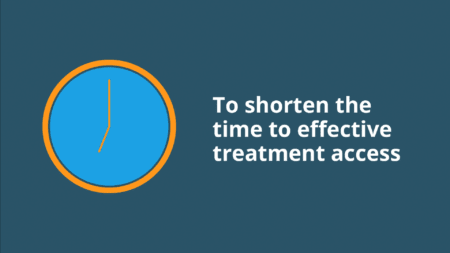It’s #TimeToGetTested
Understanding the role of mutations and biomarker testing is one of most important things patients must learn. Uncovering the driving force behind each individual’s tumors is not just important, it is critical. Biomarker testing is an opportunity to improve and optimize treatment – possibly avoiding unnecessary treatments and getting to the right treatment sooner. Currently, biomarker testing rates in the gastrointestinal stromal tumor patient population are relatively poor – only about 26.7% of patients have had testing done. The Life Raft Group Patient Registry, which is a group of extremely proactive patients, notes only about 53% of patients are aware of their mutation.
This is why the LRG is launching the It’s Time campaign. It is time to stop talking and take action to assure patients get tested. The goals of this campaign are to improve the understanding of biomarker testing in the cancer community and increase the number of patients tested.
In this post, our partners at Fundación GIST Chile discuss shortening the time to effective treatment access.
It’s time to shorten the time to effective treatment access!
From Scratch to Hatch: Establishing a Country-Wide Network of Mutational Analysis for Chilean GIST patients
By Matías Muñoz Medel
Medical Technologist MSc(s) Research Assistant at STORM & Board Member Fundación GIST Chile
 GISTs are a special kind of tumor. In their majority, they harbor mutations mainly in KIT or PDGFRA genes that can be used as potential therapeutic targets with approved drugs such as imatinib or sunitinib. Other genes are also being studied, with some therapies in research or release, as is the case of avapritinib, ripretinib, and larotrectinib. As many recent reports have pointed out, GIST patients can experience incredible treatment outcomes when they receive the correct drug that best suits their mutational characteristics.
GISTs are a special kind of tumor. In their majority, they harbor mutations mainly in KIT or PDGFRA genes that can be used as potential therapeutic targets with approved drugs such as imatinib or sunitinib. Other genes are also being studied, with some therapies in research or release, as is the case of avapritinib, ripretinib, and larotrectinib. As many recent reports have pointed out, GIST patients can experience incredible treatment outcomes when they receive the correct drug that best suits their mutational characteristics.
In Chile, as it happens with many other countries worldwide, the characterization of GIST mutations is a somewhat a recent addition to clinical practice. These studies are performed in only a few health centers, almost all located in Chile’s capital, Santiago. It was usual that GIST patients living outside Santiago, besides having to travel to the capital each time they have an appointment with their specialist, also had to personally obtain their biopsies from where they were diagnosed to deliver them to their specialist’s health center, and only in a few cases, would their GIST specialist request the mutational analysis. In most cases, Chilean GIST patients started receiving imatinib regardless of the lack of a mutational characterization, so some didn’t have good outcomes and had to switch treatment to sunitinib, or regorafenib. In some unfortunate cases, some patients couldn’t afford these drugs during the recommended treatment time. Moreover, in the beginning, GIST specialists ordered the mutational analysis only after the patients already demonstrated the progression of their disease, so many of them didn’t have the direct benefit of this kind of analysis.
Looking at the bigger picture, Chilean patients had many barriers to endure on their own to receive a treatment tailored to their GIST, as we know that not every GIST is the same. Piga Fernández, head of Fundación GIST Chile, was aware of this situation. Patients not only were in need of information, support, and advocacy for their rights to treatment, they also required better and sooner diagnoses, and mutational analysis is a powerful tool to provide that. In 2019 with support from Dr. Marcelo Garrido, medical oncologist and GIST specialist, and his research team, Piga realized one of her dreams when she created Fundación GIST Chile: To ensure that diagnoses and partial pharmacological treatments for GIST patients are covered by law..
And just recently, starting in 2020, Fundación GIST Chile, with the support of Pfizer and Dr. Marcelo Garrido´s research team, started a project to establish a network for Chilean GIST patients, caregivers, and specialists to facilitate the characterization of their mutations to provide personalized treatments, either at the very diagnosis of GIST or later, ensuring the best possible response to therapy regardless of where our patients live. This project enables Chilean GIST patients from every corner of the country to send by mail their tissue samples, biopsy results and other required documents, in order to have access to a KIT/PDGFRA mutational characterization. The results are mailed back to them and their specialists, so they can start receiving the most suitable treatment, all free of charge. Still, some rare cases would need further analyses with broader tools like Next Generation Sequencing (NGS) in search of mutations in other genes. That would be the next step, but we can happily say that today, Chilean GIST patients and specialists can know their mutations and benefit from their mutational analysis results from the very beginning of their history living with GIST.
If you would like to talk to someone about mutational testing, please contact our Director of the Life Raft Group Patient Registry, Denisse Montoya at dmontoya@liferaftgroup.org
Special thanks to the sponsors of this initiative:





